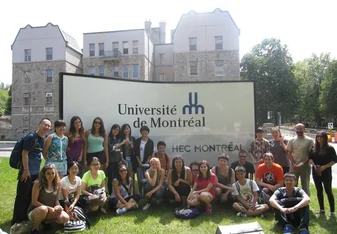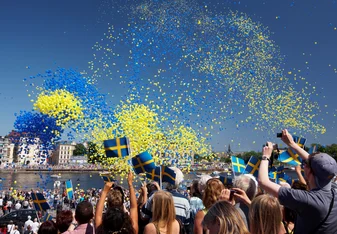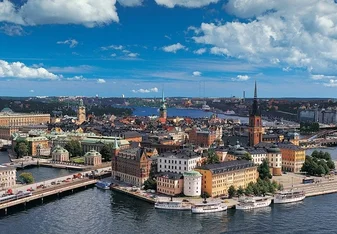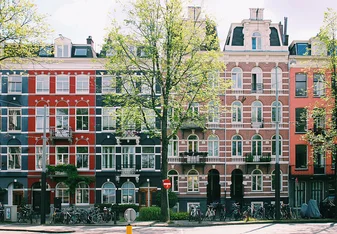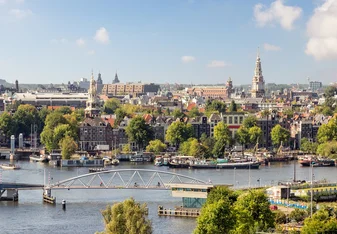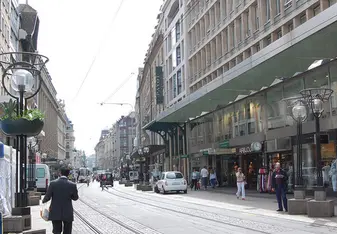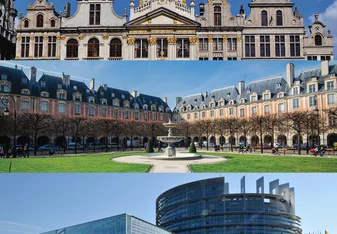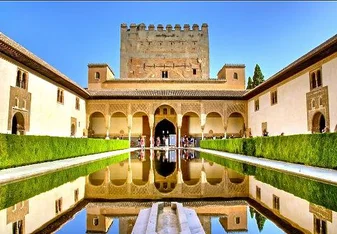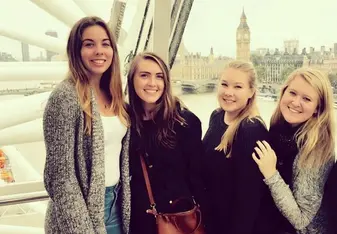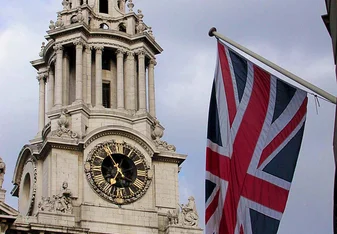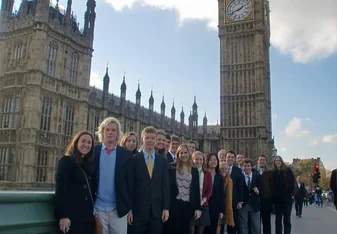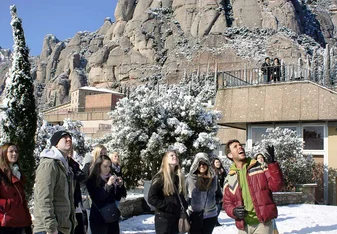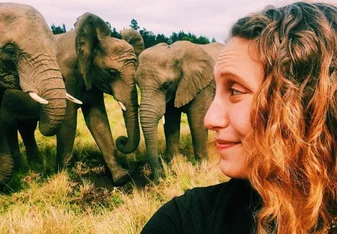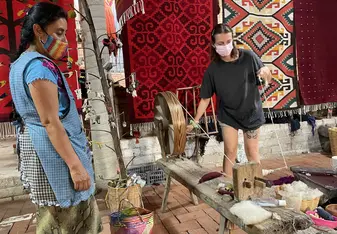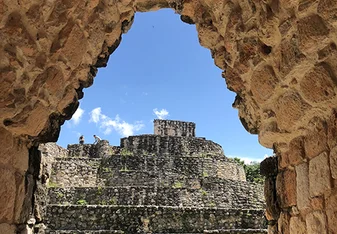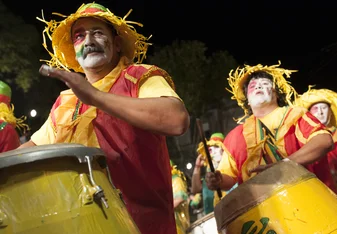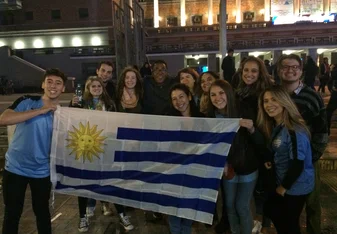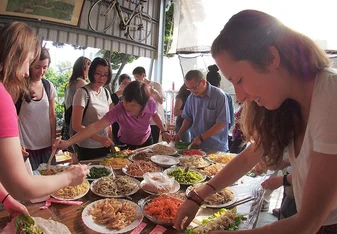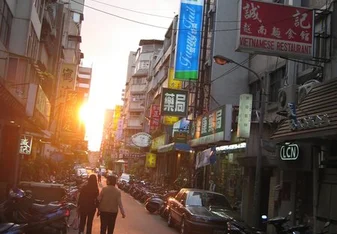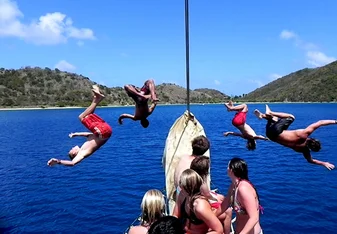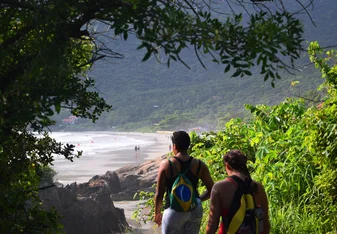12 LGBTQIA+ Friendly Study Abroad Destinations
If you’re a LGBTQIA+ student looking for a safer, funner, welcoming study abroad experience, these are the top 12 study abroad destinations for you. From Malta to Mexico, there’s a wide variety of LGBTQIA+ friendly destinations to choose from.

"[Your study abroad experience] is about to be transformative. You get to be who you want while you are traveling. You may try out new foods and activities. You may discover hidden parts of your personality. Go with it! The number one rule, though, is to stay safe.” - Mara Iverson (she/her), Former Study Abroad Advisor, Owner/Founder of Mara Iverson Equity Education & Consulting, LLC
So, you might be a queer or questioning LGBTQIA+ student looking for a study abroad location that will allow you to feel safe, while expressing and living as your authentic self. I remember when I was. But, back when I chose my program options, since I was still ‘in the closet’, I didn’t consider the importance of choosing a study abroad destination that would allow me to be out and proud.
Between studying abroad in Brazil, Mexico, and Chile (all places that have their own vibrant hub of LGBTQIA+ culture), due to having family and ties in these places, I oftentimes had to keep my queer identity to myself, which was not fun. I sometimes even felt unsafe around family and locals who would share their anti-LGBTQIA+ sentiments.
Since experiencing that, I don’t want others to have to go through the same. As an LGBTQIA+ Study Abroad Alumni and Global Education DEI Specialist, I’m here to help you choose the best study abroad locations where you can fearlessly embrace queer pride.
Also, this is not to say that you shouldn’t go to places where you have family and ties if you want to celebrate your queerness by being openly out while abroad. These are simply some recommendations based on the 2021 LGBTQ+ Travel Safety Index and alumni experiences, for awesome places where you can be out and feel proud all the time.
So let’s dive right in!
1. Canada

Canada continues to prove to be one of the best destinations for queer study abroad students. In 2005, Canada was the first country, outside Europe, to legalize same-sex marriage. Since then, the country has made vast moves to expand their efforts to support LGBTQIA+ rights.
The British Commonwealth currently ranks as #1 on the LGBTQ+ Travel Safety Index as the safest destination for LGBTQIA+ travelers. This is due to the country’s top-notch quality of life for LGBTQIA+ people, backed by legal protections under the Canadian Human Rights Act that was amended to include gender identity rights in addition to sexual orientation rights in 2017.
These days, you can find vibrant LGBTQIA+ neighborhoods throughout the country in places like Le Village Gai in Montreal, Osborne Village in Winnipeg, and Davie Street in Vancouver.
You can also find plenty of LGBTQIA+ events all year round in Canada. Toronto hosts a 10-Day Pride Festival during the end of June. During the month of May, you you can attend Fairy Tale Queer Film Festival in Calgary.
Canadian Universities throughout the country are also working to make college life as an LGBTQIA+ student a more inclusive experience by offering LGBTQIA+ student resource hubs, clubs, and peer help. If you choose to study abroad in Canada, it’s highly likely you’ll find community and belonging.
Recommended Programs
2. Sweden

In Sweden, being queer is normal, according the student blog, Study in Sweden. The country is one of the most progressive and liberal countries in the world, ranking as #2 on the 2021 LGBTQ+ Safety Index. This comes to no surprise, seeing that Sweden became the first to ever legalize gender change in 1972.
Universities in Sweden continue to make strides in inclusion for LGBTQIA+ students, from obtaining LGBTQ-Certifications for their libraries, to hosting Academic Pride seminars, and being partners of Pride events.
Sweden is also home to the world’s most popular pride events, such as Stockholm Pride, which is the largest pride event in the Nordic region, and West Pride in Gothenburg.
The queer student experience is one of such belonging that fellow Go Overseas contributor, Jordan, even wrote an LGBTQIA+ Guide to Studying Abroad in Sweden.
Recommended Programs
3. The Netherlands

In 2001, The Netherlands was the first country in the world to legalize gay marriage. Considered to be one of the most free and open-minded countries in the world, The Netherlands ties with Sweden for second place on the LGBTQ+ Travel Safety Index.
The country’s capital, Amsterdam is also a hub of LGBTQIA+ life and community. There you can find more than 100 stores and services oriented towards queer shoppers and consumers.
Other cities, like Utrercht, Hague, and Rotterdam, are great cities in The Netherlands where you can also find community and belonging as a study abroad student, too.
Recommended Programs
4. Malta

Malta, the little-known Mediterranean archipelago consisting of three islands, should get more attention as a top destination for LGBTQ+ students to study abroad since it is one out of only five countries in the world to have constitutional levels of protection for LGBTQIA+ individuals. Malta currently ranks as #4 on the LGBTQ+ Travel Safety Index.
While Maltese people of older generations might still hold on to anti-LGBTQIA+ prejudices that stem from Malta’s history as one of the formerly most religious countries in Europe, it is commonly reported that they would never act on those prejudice since the country outlawed insults and hostility against LGBTQIA+ individuals and groups in 2004.
A common notion about Malta is that the country is such an LGBTQIA+ friendly place that there is no need for LGBTQIA+ exclusive safe places. However, Valletta, a small town of less then 6,000 inhabitants, is recognized as a gay-borhood that queer tourists and locals alike recommend during a visit.
However, wherever you go in Malta, you’ll be sure to feel safe, welcomed, and celebrated.
Recommended Programs
5. Portugal

Portugal (along with Canada and Sweden) was voted as the world’s most gay-friendly travel location by the SPARTACUS International Gay Guide Index in 2019. The country also champions rights for genderqueer and transgender people, as one of six countries in Europe to allow official gender changes without medical interventions.
Currently, the country ranks as #5 on the LGBTQ+ Travel Safety Index, though it shies in comparison to its fellow top five locations when it comes to offering the best place for LGBTQ+ to live. This is due to prejudices by older generations in more rural sectors of the country and the fact that bigger cities like Lisbon and Porto are where LGBTQIA+ life is most concentrated and celebrated.
In Gay Lisbon, you can find an array of LGBTQIA+ attractions, locales, and events - everything from cafés, bars, and shops - especially in the Bairro Alto and Príncipe Real districts. Finding queer community in Lisbon and Porto can be the highlight of your study abroad experience.
Recommended Programs
6. Belgium

Belgium, home to the The International LGBTQI Youth Organisation, ranks #6 both on the LGBTQ+ Travel Safety Index and the LGBT Global Acceptance Index. The country made history in 2011 by appointing the world’s first openly gay Prime Minister.
As of 2017, 74% of the Belgian public opinion reflects acceptance of gay people. While being openly queer in Belgium is generally welcomed all throughout the country, the Saint Jacques neighborhood in Belgium is well-known as the top gayborhood in the country.
Queer culture is celebrated all year long with the Brussels Gay and Lesbian Film Festival happening in January and Belgian Pride occurring in May. The Rainbow House is a top organization of LGBTQIA+ events in the country.
In Belgium, finding belonging at events like these can help you meet other LGBTQIA+ folks - foreign and local alike - during your time abroad.
Recommended Programs
7. The United Kingdom

The United Kingdom, which makes up four different countries - including England, Wales, Northern Ireland, and Scotland - currently ranks as #7 on the LGBTQ+ Travel Safety Index. The U.K. decriminalized homosexuality in the 1960s and had been cultivating a culture more accepting of LGBTQIA+ community ever since.
Recently, the U.K. was deemed one of the top three most friendly LGBTQIA+ countries in Europe. While Brighton, England is considered to be the LGBTQIA+ capital of the U.K, you can find LGBTQIA+-friendly cities from Brighton, to Glasgow, Bristol, and beyond.
Universities across the U.K. are thought of as centers of community and belonging, too. The University of Birmingham in England is regarded as one of the most LGBTQIA+-friendly universities in the world.
Cardiff University in Wales offers a hub of resources for queer and genderqueer students and staff. The LGBTQIA+ student experience in Dublin, Ireland, seems to be one of full support and respect. In addition, Scotland became the first country in the world to include LGBTQIA+ topics into the school curriculum in 2021.
Whichever country in the kingdom you decide as your study abroad destination, you’ll be sure to find LGBTQIA+ student resources and community.
Recommended Programs
8. Spain

LGBTQIA+ study abroad students rave about Spain being a place where they felt warm and welcome with their sexual orientation and gender identities. After the end of the country’s fascist dictatorship under Francisco Franco, the country committed to making itself a secular society with an orientation towards inclusion. This is only one of the many reasons why Spain ranks as #8 on the LGBTQ+ Travel Safety Index for 2021.
Spain also legalized gay marriage 10 years before the U.S. did. Catalonia, a region in northeastern Spain, even passed an Anti-Homophobic law in 2014 that outlaws hate crimes against LGBTQIA+ people.
“In Spain, I felt safe and welcome….there were queer hubs in certain areas of the city where you could be relatively carefree, but it was still always a relief when you saw a rainbow flag as a signal of solidarity and safety [in other places, too].”
- Kylie Boggs (she/her/hers), studied abroad in Madrid, Spain in 2017
The metropolitan cities of Madrid and Barcelona are hotspots of LGBTQIA+ culture and community. There, you can find the neighborhood of Eixample, more commonly known as Gayxample, which is bustling with LGBTQIA+ attractions and establishments.
Whether you go to university in Barcelona, Valencia, or Seville, the universities in Spain are recognized as some of the top LGBTQIA+-friendly campuses in the world.
Recommended Programs
9. Mexico

Mexico has a rad and vibrant LGBTQIA+ culture, most visible in places like Mexico City and Guadalajara. While the country provides rights and protections for sexual orientation, unfortunately, when it comes to gender expression, the country has some ways to go. Mexico currently ranks as #33 of the LGBTQ+ Travel Safety Index, scoring a B-
However, that doesn’t mean that you can’t find a vibrant community of trans activists, Drag Queens, and queer people of all ages in Mexico City’s Zona Rosa and Guadalajara’s Prisciliano Sánchez sector.
Mexico city is considered by many as the gay capital of Latin America, which makes sense as to why the annual Pride event there attracts about one million participants from all throughout the country and the world every year in June.
I personally studied abroad in Mexico in 2017 and Mexico city was the first place where I delved into the LGBTQ+ scene as a young queer person slowly coming “out of the closet”. Throughout Mexico, I found queer community and belonging - even in smaller cities, like Oaxaca, where I conducted my field research. These experiences proved to show me that no matter where I go, I will find community and belonging as an queer person.
Recommended Programs
10. Uruguay

Uruguay, the little-known country located in South America, is recognized as one of the foremost leaders in LGBTQIA+ rights in the world. Homosexuality was legalized in Uruguay in 1933 and since legalizing same-sex marriage in 2013, the country has been making strides to promote LGBTQIA+ rights throughout the country and the continent. Uruguay currently ranks as #9 on the LGBTQ+ Safety Travel Index.
In Uruguay, queer community won’t be hard to find - especially with the visibility of LGBTQIA+ events throughout the year. Montevideo, the country’s capital, hosts a couple of huge LGBTQIA+ events throughout the year, like the Pride, also known as Marcha por la diversidad, in October and Punta Pride in February.
Unsurprisingly enough, feminists, the youth, and the LGBTQ+ community prove to be the change-agents behind these policy changes and rights. So, if you’re looking to find community among other open-minded people, university in Uruguay is the place to be.
Recommended Programs
11. Taiwan

Although Taiwan currently ranks as #43, scoring a C+, on the LGBTQ+ Travel Safety Index, the country is recognized as a leader in LGBTQIA+ rights in Asia, being the first country in the continent to legalize same-sex marriage. Not only this, but technically, homosexuality has never been outlawed in Taiwan.
Considered as one of the safest countries in the world to visit during the Coronavirus pandemic, Taiwan hosted the largest in-person Pride event since the onset of the pandemic, in 2021 which attracted more than 130,000 people.
LGBTQIA+ clubs at Taiwanese universities, such as the National Taiwan University clubs GayChat and Lambda have been long in existence, though have had to keep their club identities closeted. Once again, LGBTQIA+ youth and students pave the way for LGBTQIA+ rights and recognition. If you want to experience community, Taiwan could be a great place to take your studies abroad!
Recommended Programs
12. Brazil

Brazil scores an A-, ranking #15 on the LGBTQ+ Travel Safety Index, though noted as having a recent increase in hate crimes and violence against LGBTQIA+ - especially trans - individuals.
However, the county’s coastal cities and locations, like Rio de Janeiro, São Paolo, Floriánopolis and Salvador da Bahía, foster safe havens for LGBTQ+ community that gather throughout the country during different annual events that happen all throughout the year.
Briyana, a Black queer person who studied abroad with CIEE in Brazil, found community in São Poalo and Salvador da Bahía. “Being Black and coming to terms as being non-binary in Brazil was was such an amazing experience because I was surrounded by other Black queer people who I could connect to in so many ways.”
Experiences like these prove to show that even while public policy and public opinion might shift and change, the power of community among people who you relate to as an LGBTQIA+ person, could be key to ensuring that you have an amazing time abroad.
Recommended Programs
Where should I study abroad?
As a queer study abroad alumni, I understand how important it is to choose the best program for you that’s in a location that supports your identity. More importantly, you have to make that decision based on what you’re looking to get out of your study abroad experience as an LGBTQIA+ student.
Whether you’re looking for complete and total freedom with your identity in small and welcoming places like Malta, finally being considered the norm in Sweden, part of the LGBTQIA+ movement in Taiwan, or part of a vibrant Black LGBTQIA+ community in Brazil, there are plenty of options for you.
Wherever you go, just be sure to do your research and choose the place that lets your heart sing and your identity shine.
From one queer study abroad alumni to all you future LGBTQIA+ study abroad alumni, best of luck to you on finding your best program and your best self!

